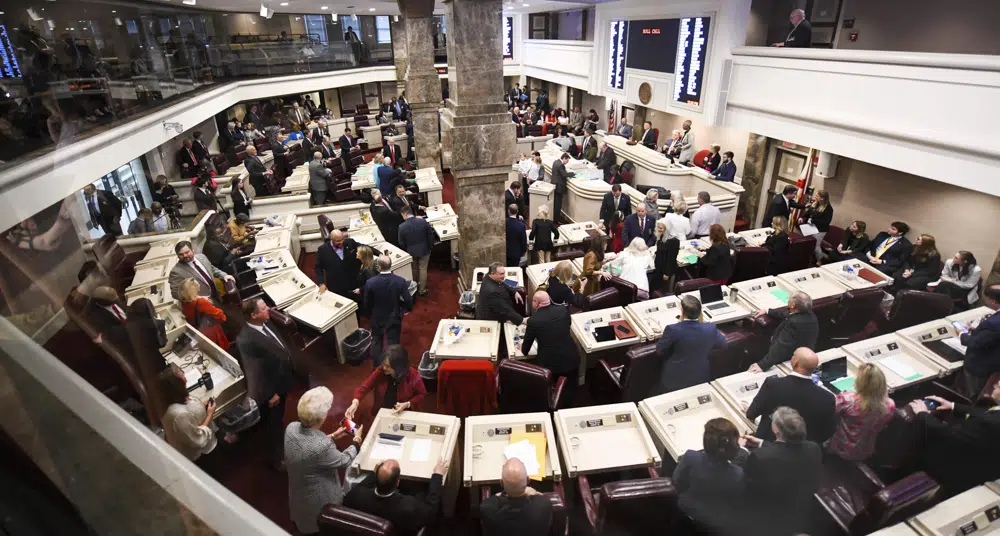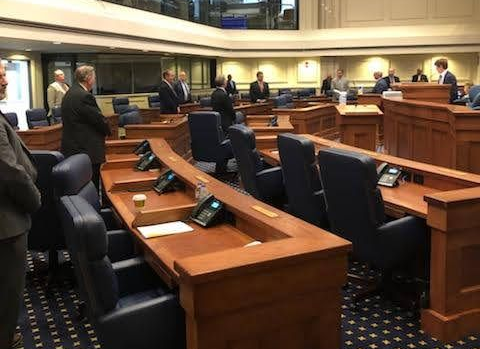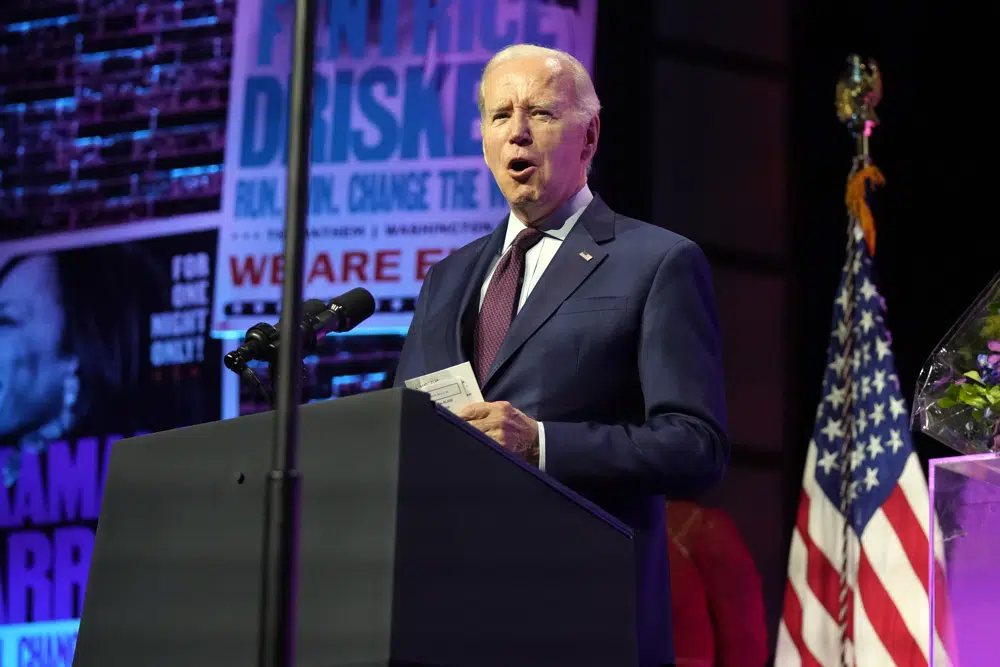House Committee advances legislation providing stipends to principals who receive additional training

On Wednesday, the Alabama House of Representatives Ways and Means General Fund Committee advanced legislation that would provide up to $15,000 in additional stipends for principals who complete advanced leadership training. Senate Bill 300 (SB300) is sponsored by State Senator Arthur Orr. “This bill will be important for principals, compensating them and increasing the training for principals,” Orr explained. “There are extra stipends for hard-to-fill schools,” Orr said. “The principals are very much for it around the state.” The Senate adopted a substitute version of the bill. The substituted version of SB300 passed the Senate on Tuesday by a vote of 34 to 0. The legislation is being carried in the House by State Representative Alan Baker. Baker said this bill “creates the School Principal Leadership and Mentoring Act.” The synopsis states, “Existing law requires principals and assistant principals to complete five professional learning units every five years specific to serving in those administrative positions beyond the initial instructional leadership certification provided by state institutions of higher education. This bill would create the School Principal Leadership and Mentoring Act. This bill would require the creation and implementation of the Alabama Principal Leadership Development System and would require all principals and assistant principals to attend and satisfactorily complete the program.” Baker said that the bill provides a $10,000 stipend for principals that complete the program plus $5000 for those “serving in low-performing or high-poverty schools.” Rep Terri Collins said, “One of the biggest issues we have is discipline. I think this could really make a difference in student performance.” “I am pleased with all of the things I see in this,” Collins said. Rep. Debbie Wood asked, “Where did the $850,000 appropriation come from?” Baker said, “This rolls out in phases.” A clerk answered, “That is based on the figure that is in the ETF budget.” Committee Chairman Danny Garrett said, “Principals are so key and critical in good schools.” Garrett said, “My son, who is a teacher, told me, ‘I think anyone who is a principal for five years needs to go back to a classroom, and everyone who wants to be a principal needs to shadow a principal first.’” Baker said, “Professional development at the K-3 level would show them (principals) what proper teaching is in regard to the Literacy Act and the Numeracy Act.” The bill also appoints a 21-member design team and states a professional leadership academy. The legislation could be considered by the full House as early as Thursday. Thursday will be day 22 of the 2023 Alabama Regular Legislative Session. The legislature is limited to thirty legislative days in the regular session. To connect with the author of this story or to comment, email brandonmreporter@gmail.com.
Senate rejects due process for student discipline bill

On Tuesday, the Alabama Senate voted to reject controversial legislation that would have set up a formal due process standard for disciplining a child in an Alabama public school. Senate Bill 181 (SB181) is sponsored by State Senator Rodger Smitherman. The synopsis states, “This bill would provide a uniform statewide system of procedural due process protections relating to the suspension and expulsion of public school students for violating the student code of conduct or state law. This bill would also provide for the adoption of any necessary rules to implement this act by the State Board of Education.” The bill, after being amended, was voted down rapidly with no floor debate. Smitherman then took an hour of time during the next bill to voice his unhappiness with the Senate’s rejection of his legislation. “Last year, we passed the same bill out of the Senate almost unanimous,” Smitherman said. Last year the legislation failed in the House of Representatives. The legislation was staunchly opposed by Alabama School Superintendents and other education supporters. “It is obvious they did a good lobbying effort among our colleagues to kill the bill,” Smitherman said. “The school superintendents, they have elevated their power now to the point that they can convince all but eleven people that these children do not need due process.” “Those little children ain’t going to have anybody standing out there (in the Statehouse halls) talking for them,” Smitherman said. “Who is getting suspended? Who is getting so many days? and for what reason?” Smitherman said heavily, implying that school systems target Black students, particularly males, for discipline. “The teacher is the judge, jury, and executioner,” Smitherman said. “They (the accused children) don’t get the first benefit of the doubt,” Smitherman said. “They are guilty until they are proved innocent.” The most controversial element of Smitherman’s legislation was giving a student the right to face their accuser. The Greene County Superintendent testified before committee that students fear retaliation by other students, so a student who might tell a teacher that another child has a gun in school; would not come forward if her identity was revealed. Smitherman also opposes the mandatory kindergarten bill that would force a child who did not attend kindergarten as a five-year-old to be denied admission into first grade. He also opposes the Alabama Literacy Act provision that a child that can’t read at grade level by the end of the third grade will have to repeat third grade. “First, they want to hold them back in the first grade,” Smitherman said. “If they don’t get them there, then they want to hold them back in third grade. If they don’t get them there, then they use these discipline policies to suspend or expel them.” “They ain’t going to stay in school when they are 21,” Smitherman said. “If they don’t get an education, they ain’t gonna get a job. If they have no job, they can’t eat.” Smitherman called the schools a “pipeline to prison.” The Legislature is also concerned with criminal gangs operating within many Alabama schools. The Senate voted down SB181 11 to 20. Jabo Waggoner, Tom Butler, Arthur Orr, and Greg Reed were the only Republicans to vote for the bill. Billy Beasley was the only Democrat who voted against the legislation. The controversial legislation appears to be dead for this session. To connect with the author of this story or to comment, email brandonmreporter@gmail.com.
Alabama House votes to advance state cookie legislation

On Tuesday, the Alabama House of Representatives voted to pass legislation establishing the yellowhammer cookie as the official state cookie. House Bill 421 (HB421) is sponsored by State Representative Reed Ingram. Reed explained that legislation making the “Yellowhammer Cookie” the official state-designated cookie was brought to him by the Fourth graders at Trinity Presbyterian School in Montgomery. Katherine Bandy is a counselor at Trinity. “We are learning about state symbols and Alabama history,” Bandy said. “And we figured out that Alabama doesn’t have a state cookie.” Reed explained that the students resolved to fix this situation by holding a cookie contest. The fourth graders submitted cookies, and the seniors judged them. Ultimately the Yellowhammer Cookie was judged the best cookie to submit to the legislature. “We needed a state cookie,” Bandy said. Mary Claire Cook developed the winning recipe. Alabama Today asked Cook if making the cookie was something an ordinary person could do or if it required a factory to produce. “Anyone can make it,” Cook assured. “I make it myself.” The Yellowhammer Cookie contains oats and pecans and has a peanut butter filling. Bandy explained that those three ingredients are essential because they are grown here in Alabama by Alabama farmers. The pecan is already the official nut of Alabama, and the peanut is the official legume of the state of Alabama. Cook explained that she began this project with her grandmother. They looked up recipes and began substituting in Alabama ingredients before arriving at the Yellowhammer Cookie. The Yellowhammer Cookie was chosen over two dozen other submissions. The fourth graders from Trinity were on hand at the House gallery to watch the bill be debated on the Alabama House of Representatives floor. Ingram explained that the last state symbol passed by the legislature was the decision to make the sweet potato the official state vegetable. Speaker of the House Nathaniel Ledbetter recognized the fourth graders for their involvement in the legislative process. At Ledbetter’s request, the whole body gave them a round of applause in recognition of their work. State Rep. A.J McCampbell told Ingram, “Usually when you have a bill, I have got to scrutinize it. The only problem I have with this bill is that you are asking us to designate this the state cookie, and I have not had one. I need a cookie. Where’s my cookie?” Ingram said, “I think they can arrange that.” Rep. Danny Garrett told Ingram, “One thing I have learned about you other than you are a great legislator and a great man is that you know cookies.” Rep. Napoleon Bracy said, “I got into politics when I ran for president of the SGA.” “Students learn Alabama history in the fourth grade,” Bracy explained. Ingram said, “We had a big shout-out to George Washington Carver for his work with the peanut.” Ingram explained that the Yellowhammer Cookie “is kind of like an oatmeal cookie with peanut butter in the middle.” “Is this something that we can mass produce? Have we trademarked this?” Bracy said. “This is something they can talk about on Shark Tank.” “This is something great for these students,” Bracy said. “It is uncontroversial. A lot of times, the first two bills on the calendar are kind of divisive.” Rep. Mary Moore said, “I want to thank you for paying attention to young people. I appreciate you for highlighting Dr. Carver and his work.” Speaker Ledbetter thanked former Congresswoman Martha Roby for helping the children navigate the legislative process with their bill. HB421 was passed 103 to 0. It now goes to the Alabama Senate for their consideration. Ingram told Alabama Today that he thinks Senator Will Barfoot will carry the bill in the Senate. The Art of Alabama Politics Facebook page shared the recipe. Wednesday will be day 22 of the 2023 Alabama Regular Legislative Session. To connect with the author of this story or to comment, email brandonmreporter@gmail.com.
Steve Flowers: Lurleen Wallace

Kay Ivey is Alabama’s second female governor. Lurleen Wallace was the first. Appropriately, Kay Ivey’s idol and impetus for striving to be governor was Lurleen Wallace. Kay’s first involvement in state politics was as a campaign worker for Governor Lurleen’s 1966 race for governor when Kay Ivey was a student at Auburn. It was 55 years ago, in May 1968, that our first female governor, Lurleen Wallace, passed away. She was a genuinely humble person. Lurleen Wallace was very popular. The state fell in love with her. She was not only beloved, she was also a good governor for the 18 months she served before she succumbed to cancer. Her husband, George Wallace, was first elected governor in 1962. He had ridden the race issue to the governorship and had made segregation the hallmark issue of his first four years. He had become the paramount king of segregation in the nation. He was very popular. However, he was forbidden by the Alabama Constitution from seeking a second, consecutive term. The idea of George Wallace running his wife Lurleen as his proxy had been tossed out by a few of his cronies as a joke. After a few weeks, the idea grew on Wallace. He made calls around the state and began to realize that dog might hunt. George and Lurleen met when he was a 22-year-old law student at the University of Alabama. He met her at a dime store in Tuscaloosa where she was a 16-year-old clerk. She was born and raised in Northport. They soon thereafter got married. Wallace’s life and devotion were to politics and being governor of Alabama. Lurleen was content to be a behind-the-scenes mother. George’s passion was politics. Lurleen’s passion was being a mother and going fishing. Lurleen was a genuinely sweet lady. Her humble background as a dime store clerk in Northport endeared her to Alabamians. She was gracious and sincere, and people fell in love with her. Lurleen had been diagnosed with cancer two years prior to the 1966 election. Although it seemed to be in remission, her health was not excellent. The campaigning was a challenge to her. She did not cherish the spotlight like George. Instead, she preferred her quiet time. She had been a mother and father to four children. However, after Lurleen agreed to run, it seemed to grow on her. She was a quick study. She got better day after day. As the crowds grew, you could feel the momentum and surge in popularity. She seemed to thrill to it. Lurleen’s landslide victory in May of 1966 was astonishing. She set records for vote-getting, some of which still stand today. She defeated nine male opponents without a runoff. Left in the carnage was an illustrious field of proven veteran political men. Included in the field she demolished were sitting Alabama General Richmond Flowers, Jasper Congressman Carl Elliott, State Senator Bob Gilchrist, Dothan businessman Charles Woods, two former governors John Patterson and Big Jim Folsom, popular state Agriculture Commissioner A.W. Todd, and of course Shorty Price. She then went on to trounce the most popular Republican in the state, Republican Congressman Jim Martin, by a two-to-one margin. Lurleen Wallace became Governor in January of 1967. She warmed to the job and made a very good governor. She let George know that she was Governor. However, she lived less than two years after she took office. Soon after her Inauguration, she visited the state’s mental hospital in her native Tuscaloosa County. She was so moved by the deplorable conditions that she made it her mission to improve the mental health facilities in the state. She gave one of the most moving speeches ever delivered before a legislature that resulted in the passage of a major bond issue to support mental health. Lurleen was also instrumental in the creation of a major cancer center at UAB. It came to pass after her death. She became beloved by Alabamians. She showed amazing grace and courage as she battled against cancer. When she died, the outpouring of sympathy from the people of the state was unparalleled. Thousands of Alabamians filed by her casket in the Capitol Rotunda. Schools let out, and school children came to Montgomery from all over the state to pay their respects to our Lady Governor. See you next week. Steve Flowers is Alabama’s leading political columnist. His weekly column appears in over 60 Alabama newspapers. Steve served 16 years in the state legislature. He may be reached at www.steveflowers.us.
Joe Biden scraps planned visit to Australia, Papua New Guinea to focus on debt limit talks

President Joe Biden said Tuesday he’s curtailing his upcoming trip to the Indo-Pacific, scrapping what was to be a historic stop in Papua New Guinea as well as a visit to Australia for a gathering with fellow leaders of the so-called Quad partnership so he can focus on debt limit talks in Washington. The scuttling of two of the three legs of the overseas trip is a foreign policy setback for an administration that has made putting a greater focus on the Pacific region central to its global outreach. Biden said he still plans to depart on Wednesday for Hiroshima, Japan, for a Group of Seven summit with leaders from some of the world’s major economies. He will return to the U.S. on Sunday. “I’m postponing the Australia portion of the trip and my stop in Papua New Guinea in order to be back for the final negotiations with congressional leaders,” Biden said at the start of a Jewish American Heritage Month event at the White House. He added, “The nature of the presidency is addressing many of the critical matters all at once. So I’m confident we’re going to continue to make progress toward avoiding the default and fulfilling America’s responsibility as a leader on the world stage.” Biden said he spoke to Australian Prime Minister Anthony Albanese earlier on Tuesday to inform him he was postponing a visit to Australia and invited him to Washington for an official state visit at a yet-to-be determined date. White House staff broke the news to Papua New Guinea Prime Minister James Marape. White House officials did not offer an immediate response to questions about when Biden might reschedule visits to the two countries. “Revitalizing and reinvigorating our alliances and advancing partnerships like the Quad remains a key priority for the President,” White House press secretary Karine Jean-Pierre said. “This is vital to our ability to advance our foreign policy goals and better promote global stability and prosperity. We look forward to finding other ways to engage with Australia, the Quad, Papua New Guinea, and the leaders of the Pacific Islands Forum in the coming year.” Japanese Prime Minister Fumio Kishida has invited Albanese, Indian Prime Minister Narendra Modi as well as Pacific Island leaders to come to Hiroshima during the G-7. Albanese, in an Australian Broadcasting Corp. interview, said that the Quad leaders are now hoping to hold a meeting in Hiroshima. “We’ll also hopefully be able to find a time when the four of us can sit down,” Albanese said. “We will have to organize the logistics of the Quad meeting now in Sydney, and we’ll be discussing with our partners in the U.S., but also Japan and India over the next day or so.” Biden had been scheduled to travel on to Papua New Guinea to meet with Pacific Island leaders and then to Australia for a meeting of the leaders of the Quad partnership, made up of the U.S., Australia, India, and Japan. The Papua New Guinea stop would have been the first visit by a sitting U.S. president to the island country of more than 9 million people. The Quad partnership first formed during the response to the 2004 Indian Ocean tsunami that killed some 230,000 people. Since coming into office, Biden has tried to reinvigorate the Quad as part of his broader effort to put greater U.S. focus on the Pacific and counter increasing economic and military assertiveness by China in the region. Biden announced his decision soon after he wrapped up a meeting on Tuesday afternoon with Republican House Speaker Kevin McCarthy, Senate Minority Leader Mitch McConnell, R-Ky., Senate Majority Leader Chuck Schumer, D-N.Y., and House Minority Leader Hakeem Jefferies, D-N.Y., for talks on the debt limit standoff. Earlier Tuesday, White House National Security Council spokesman John Kirby expressed administration officials’ frustration that the debt talks are having an impact on the president’s dealings on the international stage. “We wouldn’t have to have this conversation. I wouldn’t have to answer these questions if Congress just did the right thing,” Kirby said. Some Republican lawmakers questioned Biden’s decision to travel overseas considering the consequences of the debt limit talks. “I think he should not leave, and he should focus on the debt limit here at home,” Sen. Rick Scott, R-Fla. With the brief stop in Papua New Guinea to meet with Pacific Island leaders, Biden had hoped to demonstrate that the United States is committed to remaining engaged for the long term in the Pacific Islands. The area has received diminished attention from the U.S. in the aftermath of the Cold War, and China has increasingly filled the vacuum — through increased aid, development, and security cooperation. Biden has said that he’s committed to changing that dynamic. Last September, Biden hosted leaders from more than a dozen Pacific Island countries at the White House, announcing a new strategy to help to assist the region on climate change and maritime security. His administration also recently opened embassies in the Solomon Islands and Tonga, and has plans to open one in Kiribati. As vice president, Biden saw up close how domestic politics can complicate foreign policy during the 2013 government shutdown. President Barack Obama was forced to bail on attending the Asia-Pacific Economic Cooperation summit and the East Asia Summit in Brunei as well as a visit to Malaysia and the Philippines in the midst of a government shutdown as he negotiated with GOP leaders. President Bill Clinton opted to skip his scheduled participation in the APEC summit in Japan in the midst of the 1995 government shutdown. He opted to send Vice President Al Gore in his place. Republished with the permission of The Associated Press.
U.S. Supreme Court sides with Alabama inmate who seeks to die by nitrogen hypoxia

The U.S. Supreme Court on Monday sided with an Alabama death row inmate, who had his lethal injection called off at the last minute in November, and argues he should be put to death by nitrogen hypoxia when he is ultimately executed. Justices, without comment, rejected the Alabama attorney general’s request to review an 11th U.S. Circuit Court of Appeals decision regarding inmate Kenneth Eugene Smith. The state argued the decision disregarded Supreme Court precedent that an inmate challenging an execution method must show that an alternative method is readily available, not just feasible. Alabama has authorized nitrogen hypoxia — death as a result of breathing pure nitrogen — as an execution method, but no state has attempted to use the untested method to put an inmate to death. Smith was scheduled to be put to death by lethal injection on Nov. 17, 2022, for the 1988 murder-for-hire slaying of a preacher’s wife. On the day of the execution, a divided 11th Circuit panel stayed the execution after Smith raised concerns about previous lethal injections in the state and suggested nitrogen hypoxia as an available alternative method. The Supreme Court disagreed and lifted the stay. However, prison officials ended up calling off Smith’s execution for the night after staff were unable to find a suitable vein to connect the second of two intravenous lines to Smith’s body. Justices Clarence Thomas and Samuel Alito dissented from the Supreme Court’s opinion, saying they would hear the case. “The Eleventh Circuit’s error is not only plain but also serious enough to warrant correction,” Thomas wrote in a dissent. Alabama Gov. Kay Ivey in November announced a pause in executions to conduct an internal review of procedures. The review came after problems with intravenous lines caused multiple executions to be canceled or delayed. The state is seeking to resume executions this summer. Attorneys for Smith have claimed his November execution attempt was botched. Smith has an ongoing lawsuit seeking to prevent the state from making a second attempt to execute him by lethal injection. “To subject Mr. Smith to a second execution by lethal injection would subject him to a torturous experience of unnecessary physical and psychological pain, as has been established through Alabama’s last three execution attempts,” Smith’s lawyers wrote in a December court filing. Prosecutors said Smith was one of two men who were each paid $1,000 to kill Elizabeth Sennett on behalf of her husband, who was deeply in debt and wanted to collect on insurance. The slaying, and the revelations over who was behind it, rocked the small north Alabama community. Republished with the permission of The Associated Press.


